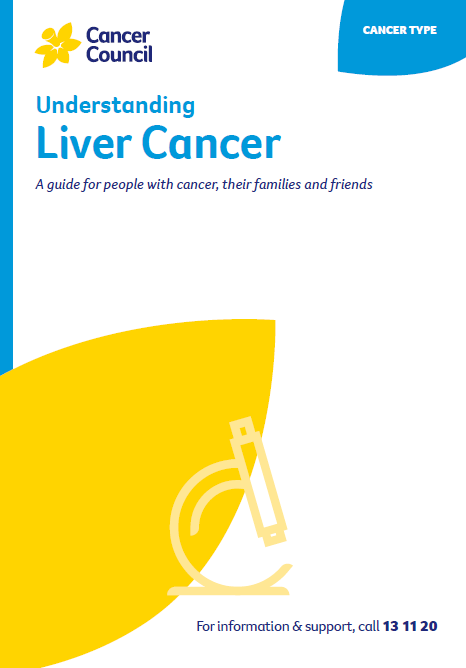- Home
- Liver cancer
- Managing symptoms
- Jaundice
Jaundice
One of the liver’s jobs is to process bilirubin, a yellow pigment formed when red blood cells in the body break down. Normally, the bilirubin passes from the liver, through the bile duct to the bowel, and then out of the body in faeces (poo).
With liver cancer, bilirubin sometimes builds up in the blood. This can be because the cancer has blocked a bile duct, the liver is not working properly, or the liver has been replaced by widespread tumour. The build-up of bilirubin in the blood is known as jaundice. It can cause yellowing of the skin and whites of the eyes, pale faeces, dark urine and itchy skin.
This itching is often worse at night. It can be relieved to some degree by keeping your skin moisturised, and avoiding alcohol, spicy food, hot baths and direct sunlight. If the itching continues, your doctor may prescribe medicine, which can sometimes help.
When jaundice is caused by a blocked bile duct, it may be relieved by unblocking the duct with a small tube made of plastic or metal (a stent). Symptoms of jaundice usually go away 2–3 weeks after the stent is put in place. The earlier the stent is inserted, the less severe the symptoms. Stenting is not always recommended or possible in advanced cancer.
Podcast: Coping with a Cancer Diagnosis
Listen to more of our podcast for people affected by cancer
More resources
A/Prof Simone Strasser, Hepatologist, AW Morrow Gastroenterology and Liver Centre, Royal Prince Alfred Hospital and The University of Sydney, NSW (clinical update); A/Prof Siddhartha Baxi, Radiation Oncologist and Medical Director, GenesisCare, Gold Coast, QLD (clinical update); Prof Katherine Clark, Clinical Director of Palliative Care, NSLHD Supportive and Palliative Care Network, Northern Sydney Cancer Centre, Royal North Shore Hospital, NSW; Anne Dowling, Hepatoma Clinical Nurse Consultant and Liver Transplant Coordinator, Austin Health, VIC; A/Prof Koroush Haghighi, Liver, Pancreas and Upper Gastrointestinal Surgeon, Prince of Wales and St Vincent’s Hospitals, NSW; Karen Hall, 131120 Consultant, Cancer Council SA; Dr Brett Knowles, Hepato-Pancreato-Biliary and General Surgeon, Royal Melbourne Hospital, Peter MacCallum Cancer Centre and St Vincent’s Hospital, VIC; Lina Sharma, Consumer; David Thomas, Consumer; Clinical A/Prof Michael Wallace, Department of Hepatology and Western Australian Liver Transplant Service, Sir Charles Gairdner Hospital Medical School, The University of Western Australia, WA; Prof Desmond Yip, Clinical Director, Department of Medical Oncology, The Canberra Hospital, ACT.
View the Cancer Council NSW editorial policy.
View all publications or call 13 11 20 for free printed copies.

